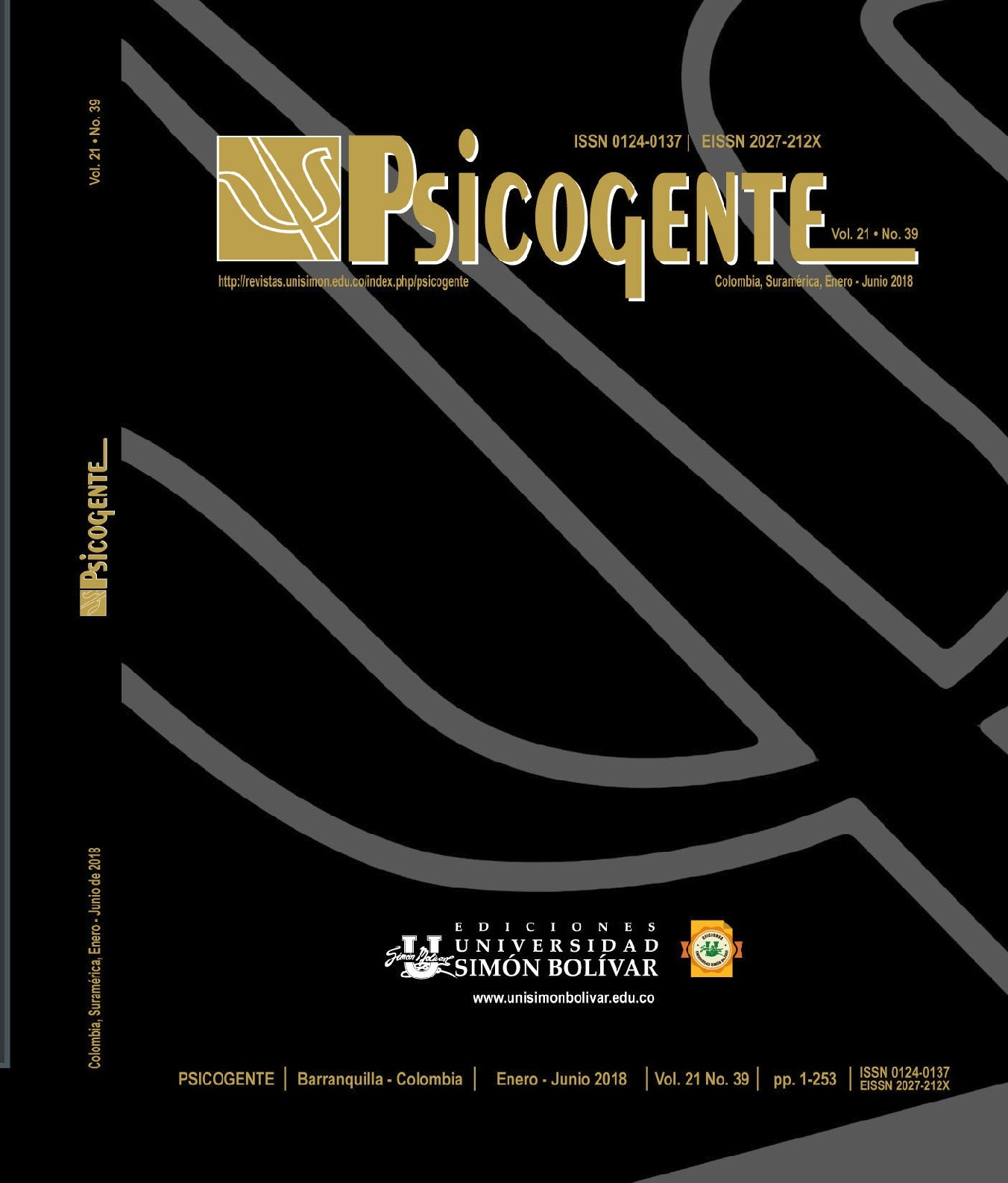Déficit de memoria operativa en los trastornos del neurodesarrollo
Working memory deficits in neurodevelopmental disorders
DOI:
https://doi.org/10.17081/psico.21.39.2832Palabras clave:
Memoria operativa, Trastornos del neurodesarrollo, Memoria, Memoria de corto plazo, Neurodesarrollo, TrastornosResumen
Resumen:
El presente artículo es una revisión sistemática que busca presentar el estado actual de este proceso cognitivo en los diferentes trastornos del neurodesarrollo, se retomó el constructo de memoria operativa de Baddeley y Hitch (1974), teniendo en cuenta su desarrollo, los sistemas que lo componen y las diferentes funciones que realiza este proceso cognitivo en el ser humano.
Seguido de esto se continúa con la presentación de los diferentes trastornos del neurodesarrollo según el Manual Diagnóstico y Estadístico de los Trastornos Mentales y la prevalencia de estos en Colombia. Por último, se analizará la memoria operativa en cada trastorno del neurodesarrollo, cuáles son los componentes más afectados en cada uno de ellos y las posibles causas que se ven asociadas a la alteración.
Descargas
Citas
Alloway, T. P. (2009). Working memory, but not IQ, predicts subsequent learning in children with learning difficulties. Journal of Psychological Assessment, 25(2), 92-98. Doi: https://doi.org/10.1027/1015-5759.25.2.92
Alloway, T.P. (2011). A comparison of working memory profiles in children with ADHD and DCD. Child Neuropsychology, 17(5), 483-494. Doi: 10.1080/09297049.2011.553590
American Psychiatric Association (2013). Diagnostic and statistical manual of mental disorders: DSM-5 (5th Ed.). Arlington, Virginia: American Psychiatric Association.
Arteaga, G. & Pimienta, H. (2006). Memoria operativa y circuitos corticales. Revista de la Facultad de Medicina Universidad Nacional Colombia, 54(4), 248-268. Doi: 10.15446/revfacmed
Baddeley, A.D. (2012). Working memory: theories, models, and controversies. Annual Review of Psychology, 63, 1–29. Doi: http://doi.org/10.1146/annurev-psych-120710-100422
Baddeley, A.D. & Eysenck, M.W. (2010). Memoria. Madrid: Alianza Editorial.
Baddeley, A.D. & Hitch, G. (1974). Working Memory. Psychology of Learning and Motivation, 8, 47-89. Doi: http://doi.org/10.1016/S0079-7421(08)60452-1
Baddeley, A.D., Gathercole, S.E. & Papagno, C. (1998). The Phonological loop as a language learning device. Psychological Review, 105(1), 158-173. Doi: http://dx.doi.org/10.1037/0033-295X.105.1.158
Campbell, T., Dollaghan, C., Needleman, H. & Janosky, J. (1997). Reducing bias in language assessment: Processing-dependent measures. Journal of Speech Language and Hearing Research, 40, 519-525. Doi:10.1044/jslhr.4003.519
Corbett, B., Constantine, L., Hendren, R., Rocke, D. & Ozonoff, S. (2010). Examining executive funtioning in children with autism spectrum disorder, attention deficit hyperactivity disorder and typucal development. Psychiatry Res, 166(916), 210-222. Doi: http://doi.org/10.1016/j.psychres.2008.02.005.
Examining Criminal Justice Support Network (2009). Introduction to Intellectual Disability. Redfern, Australia: Intellectual Disability Rights Service.
Dollaghan, C. & Campbell, T. (1998). Nonword repetition and child language impairment. Journal of Speech Language and Hearing Research, 41, 11136-1146. Doi:10.1044/jslhr.4105.1136
Durton, S. (2003). A review of the biological bases of ADHD: what we have learned from imaging studies? Mental Retardation and Developmental Disabilities Research Reviews, 9(3), 184-195. Doi: 10.1002/mrdd.10079
Ellis Weismer, S., Tomblin, B., Zhang, X., Buckwalter, P., Chyoweth, J. & Jones, M. (2000). Nonword repetion performance in school-age children with and without language impairment. Journal of Speech, Language and Hearing Research, 43, 865-878. Doi:10.1044/jslhr.4304.865
Etchepareborda, M.C. & Abad-Mas, L. (2005). Memoria de trabajo en los procesos básicos del aprendizaje. Revista de Neurología, 40(1), 79-83.
Flores, J. & Ostrosky-Shejet, F. (2012). Desarrollo neuropsicológico de lóbulos frontales y funciones ejecutivas. México: Manual Moderno.
Gathercole, S.E. & Archibal, L.M. (2006). Visuoespatial Immediate Memory in Specific Language Impairment. Journal of Speech, Language and Hearing Research, 49, 265-277. Doi:10.1044/1092-4388(2006/022)
Gathercole, S.E. & Baddeley, A.D. (1990). Phonological memory deficits in language disordered children: Is there a causal connection? Journal of Memory and Language, 29, 336-360. Doi: https://doi.org/10.1016/0749-596X(90)90004-J
Gathercole, S.E. & Baddeley, A.D. (1993). Working Memory and Language. Cambridge: Lawrence Erlbaum Associates.
Goldstein, W., Carpenter, P. & Minshew, N. (2005). Verbal and spatial working memory in autism. Journal of Autism and Developmental Disorders, 35(6), 747-56. Doi: 10.1007/s10803-005-0021-x
Henry, L.A. (1991). The effects of word lenght and phonemic similarity in young children’s shortterm memory. Quarterly Journal of Experimental Psychology, 43(1), 35-52. Doi: http://dx.doi.org/10.1080/14640749108400998
Henry, L.A. (2001). How does the severity of a learning disability affect working memory performance? Memory, 9(4–6), 233-247. Doi: http://doi.org/10.1080/09658210042000085
Hulme, C. & Mckenzie, S. (1992). Working Memory and Severe Learning Difficulties. Erlbaum, Hillsdale, NJ.
Hulme, C. & Tordoff, V. (1989). Working memory development: the effects of speech rate, word length and acoustic similaritu on serial recall. Journal of Experimental Child Psychology, 47(1), 72-87. Doi: https://doi.org/10.1016/0022-0965(89)90063-5
Jarrold, C. & Baddeley, A. D. (1997). Short-term memory for verbal and visouespatial information in Down’s syndrome. Cognitive Neuropsychiatry, 2(2), 101-122. Doi: 10.1080/135468097396351
Julio, I. & Gómez, C. (2010). Discapacidad en Colombia: Reto para la Inclusión en Capital Humano. Bogotá: Colombia Líde.
Kercood, S., Grskovic, J. A., Banda, D. & Begeske, J. (2014). Research in Autism Spectrum Disorders Working memory and autism: A review of literature. Research in Autism Spectrum Disorders, 8(10), 1316-1332. Doi: http://doi.org/10.1016/j.rasd.2014.06.011
Kwon, H., Reiss, A.L. & Menon, V. (2002). Neural basis of protracted developmental changes in visuo-spatial working memory. Proceedings of the National Academy of Sciences of the United States of America, 99(20), 13336-41. Doi: http://doi.org/10.1073/pnas.162486399
Lischinsky, A., Torralva, T., Torrente, F. & Manes, F. (2008). Trastorno por déficit de atención con hiperactividad en el adulto. In E. Labos, A. Slachevsky, P. Fuentes & F. Manes (Eds.), Tratado de Neuropsicología Clínica (pp. 219-231). Buenos Aires: Akadia.
Mammarella, I. C., Lucangeli, D. & Cornoldi, C. (2010). Spatial working memory and arithmetic deficits in children with nonverbal learning difficulties. Journal of Learning Disabilities, 43(5), 455-468. Doi: https://doi.org/10.1177/0022219409355482
Martinussen, R., Hayden, J., Hogg-Johnson, S. & Tannock, R. (2005). A meta-analysis of working memory impairments in children with attentiondeficit/ hyperactivity disorder. Journal of the American Academy of Child and Adolescent Psychiatry, 44(4), 377-84. Doi: http://doi.org/10.1097/01.chi.0000153228.72591.73
Menghini, D., Finzi, A., Carlesimo, G.A. & Vicari, S. (2011). Working memory impairment in children with developmental dyslexia: Is it just a phonological deficit? Developmental Neuropsychology, 36(2), 199-213. Doi: 10.1080/87565641.2010.549868
Montgomery, J.W. (2000a). Relation of working memory to off-line and real-time sentence processing in children with specific language impairment. Applied Psycholinguistics, 21(1), 117-148.
Montgomery, J.W. (2000b). Verbal working memory and sentence comprehension in children with specific language impairment. Journal of Speech Language and Hearing Research, 43(2), 293-308. Doi:10.1044/jslhr.4302.293
Montgomery, J.W. (2003). Working memory and comprehension in children with specific language impairment: what we know so far. Journal of Communication Disorders, 36(3), 221-231. Doi: https:// doi.org/10.1016/S0021-9924(03)00021-2
National Center for Learning Disabilities (2014). The State of Learning Disabilities: Facts, Trends and Emerging Issues (3rd ed.). New York: National Center for Learning Disabilities.
O’ Shaughnessy, T. & Swanson, H. L. (1998). Do immediate memory deficits in students with learning disabilities in reading reflect a developmental lag or deficit? A selective meta-analysis of the literature. Learning Disability Quarterly, 21(2), 123-148. Doi: https://doi.org/10.2307/1511341
Ocampo Gaviria, T. & Sierra Fitzgeald, Ó. (2014). Análisis del funcionamiento de la memoria operativa en niños con trastornos en el aprendizaje 1. Acta Colombiana de Psicologia, 17(27), 81-90. Doi: http://doi.org/10.14718/ACP.2014.17.2.9
Pineda Alhucema, W.F. & Puentes Rozo, P. (2013). Estudio ex-post facto de la teoría de la mente en niños escolarizados diagnosticados con trastorno por déficit de atención-hiperactividad. Tesis Psicológica, 8(2), 144-161.
Pineda, M. (2014). Trastornos del espectro autista. Autism spectrum disorders. Anales de Pediatría, 81(1), 4-5. Doi: 10.1016/j.anpedi.2014.04.018
Rosenquist, C., Conners, F.A. & Roskos-Ewoldsen, B. (2003). Phonological and Visuo-Spatial Working Memory in Individuals with Intellectual Disability. American Journal of Mental Retardation, 108(6), 403- 413. Doi: 10.1352/0895-8017(2003)108<403:PAVWMI>
0.CO;2
Russel, J., Jarrold, C. & Henry, L. (1996). Working memory in children with autism and with moderate learning difficulties. Journal of Child Psuchology and Psyquiatry, 37(6), 673-86. Doi: 10.1111/j.14697610.1996.tb01459.x
Saeed, T. (2011). A comparative Study of Working Memory in Children with Neurodevelopmental Disorders. (Tesis Doctoral). National University of Ireland Maynooth, Irlanda.
Schuchardt, K., Bockmann, A., Bornemann, G. & Maehler, C. (2013). Working Memory Functioning in Children with Learning Disorders and Specific Language Impairment, 33(4), 298-312. Doi: http://doi.org/10.1097/01.TLD.0000437943.41140.36
Siegel, L.S. & Mazabel, S. (1989). Basic cognitive processes and reading disabilities. In H.L. Swanson, K.R. Harris & S. Graham (Eds.), Handbook of Learning Disabilities (pp. 158-181). New York: Guilford Press.
Sierra, Ó. & Ocampo, T. (2013). El papel de la memoria operativa en las diferencias y trastornos del aprendizaje escolar. Revista Latinoamericana de Psicología, 45(1), 63-79. Doi: http://dx.doi.org/10.14349/rlp.v45i1.1238
Still, G. & Schoener, E. (1996). Age-dependent decline of attention deficit hyperactivity disorder. American Journal of Psychiatry, 36(2), 159-165. Doi:10.1017/S003329170500471X
Swanson, H.L. (2015). Intelligence, Working Memory and Learning Disabilities. In Cognition, Intelligence, and Achievement (pp. 173-196). Amsterdam: Elsevier. Doi: http://doi.org/10.1016/B978-0-12-410388-7.00010-5
Swanson, H.L. & Alloway, T. (2011). Working memory, learning, and academic achievement. In K. Harris, T. Urban & S. Graham (Eds.), APA Handbook of Educational Psychology. USA: APA.
Swanson, H.L. & Beebe-Frankenberger, M. (2004). The relationship between working memory and mathematical problem solving in children at risk and not a risk for serious math difficulties. Journal of Child Experimental Psychology, 96, 471- 491. Doi: http://doi.org/http://dx.doi.org/ doi:10.1037/0022-0663.96.3.471
Swanson, H.L., Ashbaker, M. & Lee, C. (1996). Working-memory in learning disabled readers as a function of processing demands. Journal of Child Experimental Psychology, 61(3), 242-275. DOI:10.1006/jecp.1996.0016
Van der Molen, M.J., Van Luit, J.E.H., Jongmans, M.J., & Van der Molen, M.W. (2007). Verbal working memory in children with mild intellectual disabilities. Journal of Intellectual Disability Research: JIDR, 51(2), 162-9. Doi: http://doi.org/10.1111/j.1365-2788.2006.00863.x
Vélez-Álvarez, C. & Vidarte Claros, J. (2012). Trastorno por déficit de atención e hiperactividad (TDAH), una problemática a abordar en la política pública de primera infancia en Colombia. Revista de Salud Pública, 14(2), 113-128. Doi: https://doi.org/10.1590/S0124-00642012000800010
Publicado
Cómo citar
Número
Sección
Licencia
Derechos de autor 2017 Xochitl Delgado Mckay, Maryoris Zapata Zabala

Esta obra está bajo una licencia internacional Creative Commons Atribución-NoComercial-SinDerivadas 4.0.
Desde la revista Psicogente impartimos una política de respeto con nuestra comunidad científica incluyendo a nuestros autores. Los autores tienen derecho a un trato respetuoso y atento en el proceso Editorial, que las evaluaciones de sus artículos sean justas, imparciales (para ello la revista procederá con la evaluación doble ciego) y se realicen en un tiempo razonable. Se deberá mantener la confidencialidad y los permisos para proceder con la publicación. Todo cambio solicitado por parte del comité, los pares y el Editor deberán ser explícitos y claramente justificados. Especifica que los autores/as conservarán sus derechos de autor y garantizarán a la revista el derecho de primera publicación de su obra, el cual estará simultáneamente sujeto a la Licencia de reconocimiento de Creative Commons BY que permite a terceros compartir la obra siempre que se indique su autor y su primera publicación a esta revista.
Garantizamos un proceso editorial transparente: desde las acciones de recepción del articulo hasta la validación final del mismo, se hará en comunicación constante con el autor. Las modificaciones en el estado de los artículos, así como las diversas decisiones tomadas sobre él y los tiempos de ejecución empleados se realizarán haciendo uso de la plataforma OJS y de ser necesario en contacto directo a través del correo de autores y de la revista Psicogente. Así mismo se procura la escogencia de Pares revisores idóneos: con perfiles y experiencia que lleven a una avaluación de calidad de cada documento sometido a revisión.






